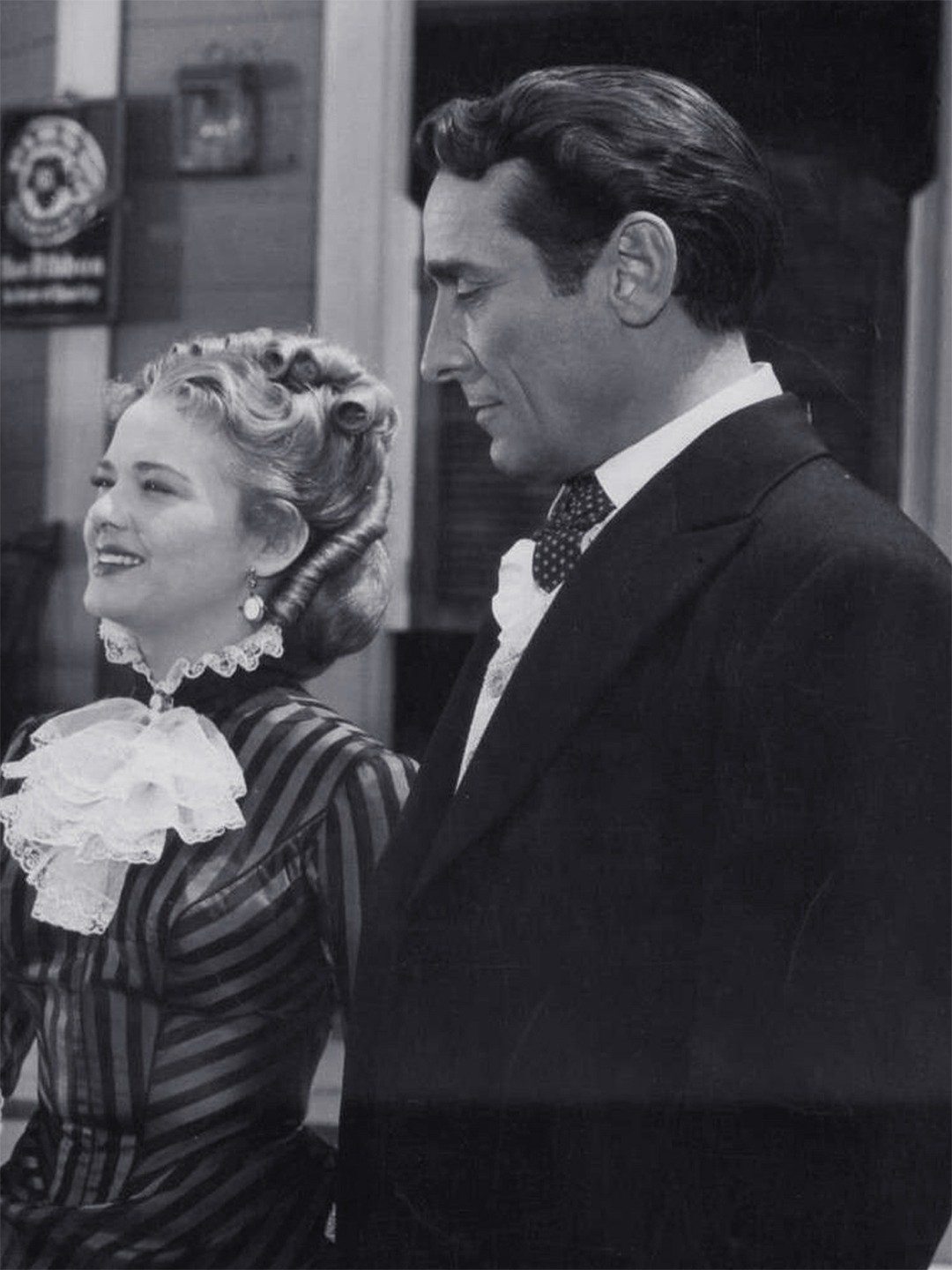
FIGHTING MAN OF THE PLAINS
(director: Edwin L. Marin; screenwriter: Frank Gruber/from the novel by “Fighting Man”; cinematographer: Fred Jackman, Jr.; editor: Philip Martin; music: Paul Sawtell; cast: Randolph Scott (Jim Dancer), Bill Williams (Johnny Tancred), Victor Jory (Dave Oldham), Jane Nigh (Florence Peel), Bill Williams (Johnny Tancred), Douglas Kennedy (Prosecutor Kenneth Vedder), Joan Taylor (Evelyn Slocum), Dale Robertson (Jesse James), Paul Fix (Yancey), Berry Kroeger (Cliff Bailey), Rhys Williams (Justice of the Peace Chandler Leach), Barry Kelley (Bert Slocum), James Millican (George Cummings), Harry Cheshire (Charles Lanyard), Burk Symon (Shopkeeper Meeker), James Todd (Mayor Hobson); Runtime: 94; MPAA Rating: NR; producers: Nat Holt/Harry Howard; Twentieth Century-Fox; 1949)
“Another one of those Quantrill raider Westerns that blurs the line between historical fact and Hollywood filmmaking.”
Reviewed by Dennis Schwartz
Another one of those Quantrill raider Westerns that blurs the line between historical fact and Hollywood film-making. It covers familiar territory and is barely tolerable, thanks only to Randolph Scott. But it breaks down in conclusion, where everything becomes incredibly nonsensical, posed and contrived. We even have Jesse James playing a good guy bank robber who heroically rescues Scott, someone who straddles the law from both sides of the fence, from an unjust hanging. It was weakly written and its plot line is unnecessarily muddled with situations that are never adequately explained by writer Frank Gruber; it’s based on his book “Fighting Man.” The black-and-white film is directed without distinction by Edwin L. Marin (“Abilene Town”/ “Johnny Angel”/”Fort Worth”).
In 1863, Jim Dancer (Randolph Scott) goes on a raid with Quantrill on Lawrence, Kansas, and in cold-blood kills the innocent Theodore Slocum, mistaken him for his brother Bert Slocum (Barry Kelley), the man who had killed Jim’s own brother. The victim’s daughter Evelyn (Joan Taylor) witnessed the killing, and Dancer becomes a wanted man. Months later, he’s seen riding with Jesse James (Dale Robertson, his film debut) and his gang. In 1871, Bert Slocum hires the Pleasanton Detective Agency of Chicago to bring Jim in for Theodore’s death. Pleasanton agent George Cummings (James Millican) captures Jim but while crossing a ferry, one of the horses rears up and his hoof crushes the side of Cummings’ head. Dancer is rescued by a stagedriver and his passenger, the saloon gambler David Oldham (Victor Jory), who cuts off Cummings’ hand to free Dancer from being handcuffed to the dead agent. Dancer then poses as Cummings in the Pleasanton’s Kansas City office, and when he wins a gun duel with a drunken cowboy bully itching for a gunfight he’s made marshal of the new town called Lanyard, Texas. The town happens to be run by the crooked Bert Slocum, who has big plans to exploit everyone including the Texas ranchers he brought in to build the railroad and pass through town with their cattle drive. Evelyn lives with her uncle, but fails to recognize Dancer (something we are asked to believe that seems unbelievable, as she was an eye-witness to the shooting). Bert uses his heavy, the gunslinger Johnny Tancred (Bill Williams), to carry out acts of violence so he can get his scheme into motion. Florence Peel (Jane Nigh) is the gambling partner of David Oldham; they own the Eldorado saloon. She becomes the love interest of Dancer, as both gamblers know his true identity and back him for marshal because they believe he’s a good man and the best lawman they have ever seen. Dancer likes working for the law and brings about law and order, but things come to a head when the bad dude Yancey (Paul Fix), an ex-Quantrill raider comes to town to do some dirty work for Slocum and will eventually recognize Dancer. Things take a turn for the worse when Dancer is exposed and quits as marshal, and the town comes under siege from an out-of-control Tancred. It leads to an unsatisfactory ending that was seemingly patched together without thought or conviction. Even the way the bad guys got their just desserts was carried out in an inefficient and unexciting way.
REVIEWED ON 7/27/2007 GRADE: C+